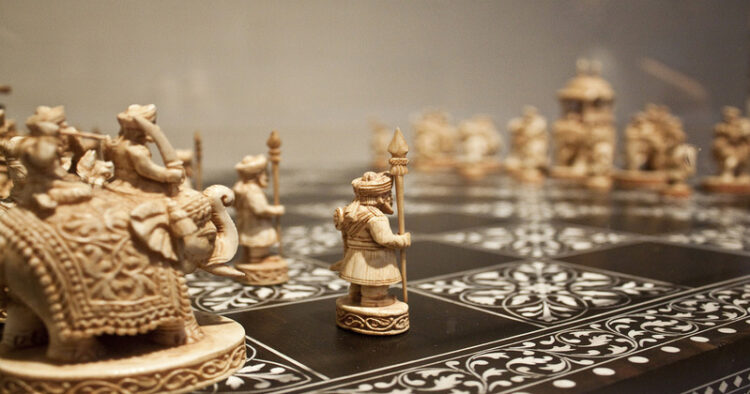The emergence of India as a chess powerhouse, with 74 grandmasters and now the host of a grand World Chess Championship is a form of historical justice for a country that had invented, loved and propagated the game a few millennia ago. In this momentous time, it’s important to remind ourselves about the contributions of India to this beautiful game.
The mere mention of chess takes our imagination back to the most iconic scenes of Mahabharata, the apparently innocuous game of dice which would lead to irreconcilable differences between brothers, the banishment of Pandavas from their kingdom, humiliation of Draupadi and ultimately a dharmic war. The evil, the foxy face of Shakuni, the sound of the dice, made out of his father’s bones rattling in his hands, his sweet words with devilish intent trapping little by little the Pandava brothers into poverty, shame and near destruction; are etched in the psyche of every Indian.
But the game of chess, originally called Chaturanga which literally means ‘four limbed’ referring to ancient army divisions of infantry, cavalry, elephantry, and chariotry predates Mahabharata. It goes back to another epic, Ramayana. Mandodari, is one of the many queens of demon king Ravana. The queen, couldn’t bear the sight of Ravana in a constant state of war, conflict and anger. She decided to pray to Lord Ganesha for a solution. Ganesha accedes to teach the game to Ravana and asks him to treat it as a real battlefield with pawns, elephants, soldiers, kings and plenty of strategy to distract him away from actual wars. With a little practice, it was Mandodari who started winning the game over Ravana. And yet the great war of Ramayana happened.
The south of India boasts of innumerable Shiva temples and has a unique place in chess history in the form of Sri Vallabha Nathar Temple, in the Tiruvarur District, Tamil Nadu. This 1000-2000 years old temple which has become famous for relieving the poisonous bites of rats and snakes is also known for the legendary story of king Vasudevan and his daughter Rajarajeswari, who was an incarnation of Goddess Parvathi. Rajarajeswari was adept in all arts and chess in particular. King Vasudevan, enamoured by his daughter’s prowess in the game, announced that he would give his daughter’s hand to whoever defeats her in the game of chess.
Legend has it that Shiva, Himself, disguised as a Siddha played the game won the game and shed his guise, giving darshan to everyone. Followed by a grand wedding with Rajarajeswari. The Lord’s victory in the chess game won him the title Chaturanga Vallaba Nathar based on the Tamil name for chess – Chaturangam.
Another hint of this beautiful game is found in the rather neglected ruins of The Sadras Dutch Fort, a tourist destination between Chennai and Puducherry, which is a distorted name of the ancient town of Saduranga Pattinam situated 5Km away. Saduranga, as mentioned earlier, is one of many names attributed to Lord Shiva.
A knight’s tour, which is now a mathematical and programming lesson in every textbook, originates from the genius mind of Swami Vedanta Desika. Swami Vedanta Desika was a poet, philosopher and polyglot who was proficient in eight languages. His extensive collection of work includes, 120 books bringing out the very essence of the Vedas. Around 750 years ago he created a form of poetry called Chithra Bhandhana. This poetry form is composed of the movement of the knight on a chessboard using 64 squares, each square containing one akshara. It was only in 1823 that the German Mathematician Von Warsdorf solved the problem of KnightsTour, 500 years after Swami Vedanta Desika, who had not only solved but had created beautiful poetry with it.
Chess not only indicates that India always celebrated cerebral capabilities but it’s also a sign of an advanced society. While most countries were rising out of barbarism, India had the luxury of time and the intellectual space for a sport that has stood the test of time. With the world chess championship coming to India, the game’s rising popularity and newfound success in the subcontinent should be seen not only as a game that is returning to its rightful home but also as a sign of a rising mind and consciousness of a nation.




















Comments